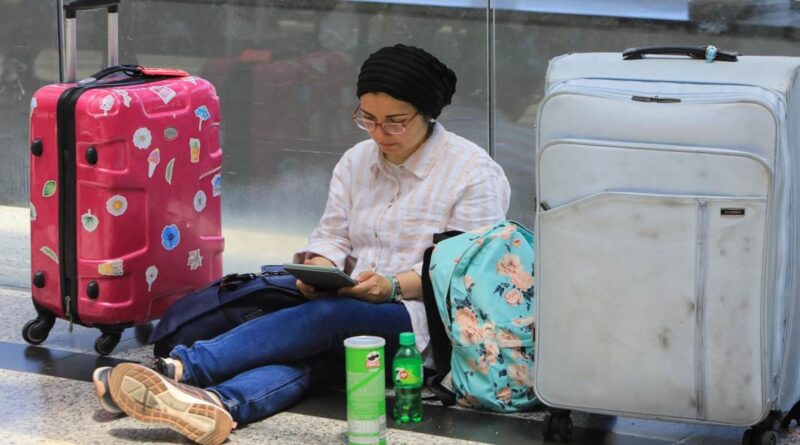Anxiety, depression, post-traumatic stress disorder… a diagnosis of the expected Lebanese war
Since the escalation between Hezbollah and Israel in southern Lebanon, a day after the war broke out in Gaza on October 7, Jana recounted how the sound of bombings, although you were far away, who became an important part of his daily life. in addition to the violation of Israeli warplanes Every day to the wall of sound, and are often at a low level.
A young woman described how the feeling of fear takes her back to the devastating war in July 2006 between Hezbollah and Israel, when she was eleven years old at the time: “Sometimes you unconsciously, you remember, and your body reflects the feeling of And those sounds take you back to the past.
Although Hezbollah and Israel have been exchanging daily bombings across the border for ten months, the level of fear of escalation recently rose in Lebanon after Tehran and Hezbollah vowed to respond to the assassination of the head of the organization’s political office. of Hamas in Palestine. Ismail Haniyeh Assassination of Hezbollah leader Fouad Shukr.
The rise in income in the south affected Jana’s income, after many of the projects of the organization she worked for stopped, which made her unable to bear the expenses of psychological therapy. He explained: “I have been suffering from anxiety and depression for some time now, but my mental state has deteriorated significantly since the start of the war.” All this reinforces “the feeling of fear of the future,” he says.
On his part, Dr. Leila Farhoud, a professor of mental health at the American University of Beirut, explained that many Lebanese suffer “from the accumulation of anxiety, depression, stress after trauma and depression,” in another country. which has suffered from many years of conflict such as civil war (1975-1990). “Parents pass their anxieties on to their children as extreme tragedies,” he added, “and what’s happening now is bringing back past anxieties, and some people are having panic attacks. as a response.”
On August 6, Israeli warplanes broke the sound barrier over Beirut at low altitude, setting off two explosions that shook windows and doors, just two days after the country celebrated its fourth anniversary of the Beirut port explosion in 2020.
When the wall of sound was heard for the first time in the Matn area near the capital, the panic attack shocked Charbel Chaaya (23 years old), a law student in Paris who had come on vacation for about a month ago. He said at the time he “couldn’t breathe and I felt numbness in my leg,” adding: “At first glance, you don’t understand what that sound is.” , the same as the one that happened on August 4, 2020.
Despite the danger of the war, Charbel decided to stay in Lebanon: “We feel guilty when we are abroad and we only follow the news worrying that something bad will happen. one of our family or friends,” noting that the escalation of the border has led to the death of at least 561 people in Lebanon, including 366 Hezbollah fighters and 116 civilians, while Israeli authorities announced the killing of 22 soldiers and 25 civilians on their side.
Almost at night, the Embrace Mental Health Association receives calls, most of which are from people in their twenties and thirties, according to psychologist and program manager of the organization, Layal Hamza, that is , a generation that never had a civil war. and maybe he doesn’t remember the 2006 war well, but he lives in fear of the port explosion.
Hamza said: “When the older generation is used to” war, this does not deny that the state of expectation “also brings to mind the collective suffering.” He explained: “Now people are more sensitive to any sound” because they are “alert”, and “anxiety levels are rising, and fear of the future.”
In the past few weeks, users on social networking sites have appealed to people to stop setting off fireworks, after they were often used to celebrate high school results or to accompanied by celebrations in Beirut, because of the concerns they raised. Video clips circulated mocking the situation, using humor to ease the tension.
Hamza also said that everyone has a different way of dealing with the situation. On the other hand, there are those who “come out of the party,” and others who “try to connect more with their environment” to find support and banish loneliness.
After hearing the wall of sound earlier this week, Andrea Fahd (28), whose apartment was destroyed in the explosion at the port, kept the windows of her house open to the sun all for fear that their glasses will break. This young woman considered herself lucky to be a dancer, and to be surrounded by people who dance with her because the daily movement helped her take her mind off it.
Fahd said: “We laugh together and walk together is a time of freedom that makes us forget many things,” but all that does not eliminate the fear of “uncertainty.” He continued: “At any time, anything can happen,” they wondered, “If the war is like this.” Trouble is in Gaza, so what’s stopping it from getting there?
#Anxiety #depression #posttraumatic #stress #disorder.. #diagnosis #expected #Lebanese #war
